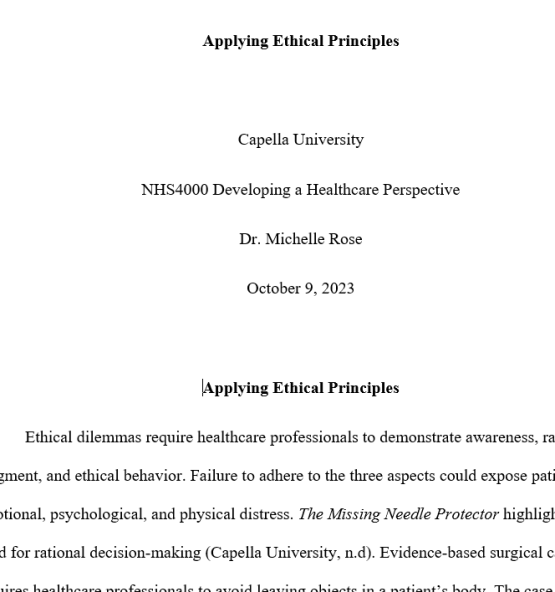
Applying Ethical Principles
Capella University
NHS4000 Developing a Healthcare Perspective
Dr. Michelle Rose
October 9, 2023
Availability:In Stock
Ethical dilemmas require healthcare professionals to demonstrate awareness, rational judgment, and ethical behavior. Failure to adhere to the three aspects could expose patients to emotional, psychological, and physical distress. The Missing Needle Protector highlights the need for rational decision-making (Capella University, n.d). Evidence-based surgical care requires healthcare professionals to avoid leaving objects in a patient’s body. The case describes one of the multiple dilemmas that have reputational and financial implications for an organization.
The scenario highlights one of the serious safety gaps that could jeopardize an organization’s reputation. The fact that the surgical team left a needle protector in the patient’s body raises concerns about the safety culture and staff adherence to policies, procedures, and standards meant to enhance the quality of care. The argument was that the needle protector was undetectable since its color resembled blood. The director of clinical services understood the implication of the issue and the need for a comprehensive response. The awareness led to Straight considering getting the patient back to the facility for a procedure to remove the needle protector. According to Kadivar et al. (2017), healthcare professionals should enhance vigilance when handling patients in complex environments.
The care team should understand their individual and collective responsibilities, including the ability to make informed decisions when faced with ethical dilemmas. The case also captured the need for organizations to fulfill the principles of beneficence and non-maleficence that advocate for a patient’s best interests and protection from physical, emotional, and mental distress. The presence of a physically and mentally weak general surgeon raised questions about the facility’s commitment to enhancing the safety and quality of patient care.
The first concern is the failure to restrict Dr. Cutrite from serving as a general surgeon. The professional’s political power in the hospital and declining mental and physical competence put patients at high risk for harm. Errors are avoidable if the director requested Dr. Cutrite to avoid performing operations. Another ethical concern is lying to the client as to why she had to come back in for another unnecessary surgery, as a solution to look for the missing needle cover. A third issue is covering up the mistake to avoid warranted lawsuits due to avoidable medical errors. Fourthly, letting the patient remain with a possible needle cap in her abdominal cavity and not being sure whether this could cause a life-threatening event raises questions about a decision to put the patient’s life at risk due to a mistake of an incompetent surgeon.
Effective communication allows healthcare professionals to demonstrate professionalism and commitment to delivering patient-centered care. The director of clinical services showed excellent skills such as active listening and collaboration to address the ethical dilemma highlighted in the case. Straight engaged the operating room supervisor and the nurse while intently listening to their responses on events that transpired during the surgery. Objective conversations create a conducive atmosphere for members of the care team to explain the situation (Howick et al., 2018). The director’s efforts to engage different professionals to show awareness about shared governance, when making decisions on safety and quality of care.
A hypothetical question asked by the director also helped strengthen the communication process. The option allowed the director to consider the options available, including getting the patient back to the surgical room. However, the director was aware of the existence of a general surgeon who was physically and mentally weak. The failure to seek feedback from Cutrite raises concerns about the director’s commitment to finding a sustainable solution to the situation. In this case, the director failed to demonstrate commitment to breaking hierarchical barriers when addressing ethical dilemmas. Kim and Cruz (2022) encouraged healthcare leaders to embrace leadership traits and qualities that enable them to eliminate the status quo and power distances created by senior members. The case highlights the need for leaders to listen intently to the staff and demonstrate rational decision-making in challenging scenarios. The situation also reminds leaders to overcome hierarchical barriers that limit them from engaging senior employees responsible for negligence and errors.
WhatsApp us
Reviews
There are no reviews yet.